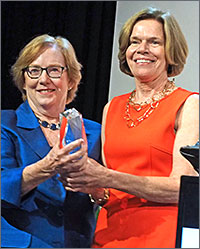Improving Care for Older Adults
News
Mary Naylor Wins AcademyHealth Distinguished Investigator Award
Cited for 'Lasting Contributions' in Health Services Research
In ceremonies at the AcademyHealth Annual Research Meeting in Boston on June 27, University of Pennsylvania School of Nursing Professor and LDI Senior Fellow Mary Naylor was presented with the organization’s 2016 Distinguished Investigator Award. The annual award honors an individual who has made “significant and lasting contributions to the field of health services research through scholarship and teaching, advancement of science and methods, and leadership.”

Naylor, PhD, RN, FAAN, is a Professor of Gerontology, Director of Penn’s NewCourtland Center for Transitions and Health, and for the past eight years directed the Robert Wood Johnson Foundation Interdisciplinary Nursing Quality Research Initiative with LDI Senior Fellow Mark Pauly.
Penn Nursing Professor and 2005 winner of the same award, Linda Aiken, PhD, RN, announced and presented the award from the AcademyHealth podium.
Naylor’s lessons
“There are lessons in Mary Naylor’s work for all of us,” Aiken told the record-sized plenary audience. “It models an exemplary health services research pathway for improving healthcare.”
In her own remarks from the podium, Naylor focused on talking to “the newest members of AcademyHealth” — those who are just beginning careers that have the potential to dramatically influence how health care is financed, organized, managed and measured.
“Engage in work that anticipates the significant societal issues of the future,” she told them. “My early experiences with the Senate Committee on Aging and Finance made me realize that the projected growth of older adults living longer with multiple chronic conditions represented such an opportunity. At that time, adults with single diseases were the research priority. Our team’s first challenge was to make a compelling case for rigorous studies focused on this emerging vulnerable population. Fortunately, this bold decision correctly anticipated what is today and will be for the foreseeable future a major global concern.”
Vulnerable populations
For the last 27 years, she has led interdisciplinary teams conducting research aimed at improving care for the elderly in vulnerable communities — particularly those patients with multiple chronic conditions that result in frequent hospitalizations.
The NewCourtland Center that she directs notes that more than 10 million Medicare beneficiaries — or approximately 20% of elderly U.S. patients — have complex, multi-morbidity health care needs that are often “poorly managed, often with devastating human and economic consequences.”
Transitional Care Model
A crucial area of Naylor’s research focus has been on elderly patients’ transitions from in-hospital stays to at-home life again. The “Transitional Care Model” designed by Naylor and her teams uses a “bridge” of intense monitoring and care that follows those patients from the hospital into their homes. Anchored by advance practice nurses, that program has proven to more effectively control elderly patients’ multiple chronic ailments, reduce the number of their re-hospitalizations, and lower the cost of their care.
Recently, her team has successfully integrated the Model within patient centered medical homes to prevent unnecessary hospitalizations of at risk community-based older adults. Her efforts to apply the Model in health care systems throughout the US also have demonstrated great promise. A 2015 Robert Wood Johnson Foundation survey found that 59% of responding health care organizations are using evidence from her research program to redesign their care systems for chronically ill older adults.
In 2015, her work in these same areas was recognized by the Gerontological Society of America that named her winner of the 2015 Doris Schwartz Gerontological Nursing Research Award for “outstanding and sustained contributions” to that field of scientific investigation.